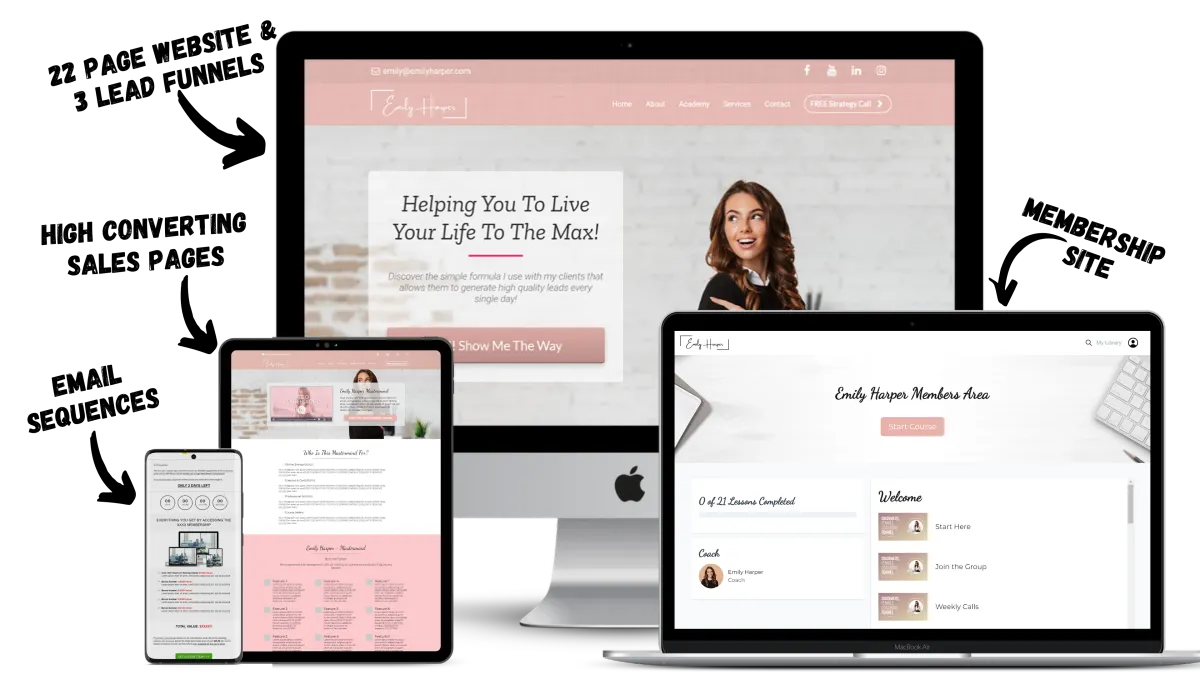
The Ultimate Guide to Launching Your First Online Coaching Program (Even if You're Just Starting Out)
The Ultimate Guide to Launching Your First Online Coaching Program (Even if You're Just Starting Out)
Starting an online coaching program can feel really challenging and overwhelming, especially if you’re new to the coaching world. But with the right approach, you can confidently launch your first program and attract eager clients.
This guide breaks down actionable steps to help you build, market, and launch a successful coaching program - even if you’re starting from scratch. So let’s dive in!
1. Define Your Coaching Program’s Focus
A well-defined focus is the foundation of a successful coaching program. What specific problem does your program solve? Who is your ideal client?
Steps to Define Your Focus:
Identify the main challenge your audience faces (e.g., is this improving productivity, struggling with weight loss, or difficulty relationship building).
Narrow down your audience to a specific group (e.g., are these busy moms, young professionals, or entrepreneurs).
Craft a 'program promise' that is clear and results-driven.
Example: Instead of “General Life Coaching,” try rephrasing to “A 6-Week Program to Help Overworked Moms Reclaim Their Time and Energy.”
Pro Tip: Survey your audience or research forums to uncover what potential clients need most.
2. Choose the Right Program Format
Online coaching can take on many different forms. Choosing the right format depends on your own expertise, your audience's preferences, and scalability goals.
Popular Coaching Formats:
One-on-One Coaching: Personalized sessions tailored to individual needs.
Group Coaching: Small groups with shared goals benefit from collaborative learning.
Self-Paced Online Courses: Pre-recorded materials clients can access anytime.
Hybrid Programs: Combination of live sessions along with pre-recorded resources.
Pro Tip: Start with a simple format that aligns with your skills and resources, then expand as you gain more experience.
3. Build a Compelling Offer
Your program’s offer is more than just a list of features—it’s the transformation you promise. Focus on the outcomes your clients will achieve.
Elements of a Great Offer:
Clear program goals (e.g., “By the end of 8 weeks, you will have...”).
Specific deliverables (e.g., weekly coaching calls, workbooks, or accountability check-ins).
Bonuses to add value (e.g., an exclusive Facebook group, additional resources, or a free 30-minute consultation).
Pro Tip: Highlight the benefits, not just the features. For example, instead of “5 coaching sessions,” emphasize and rephrase to “Gain clarity and actionable steps in just 5 weeks.”
4. Create a Marketing Plan
Your program unfortunately won’t sell itself - you need a clear plan to reach and convert potential clients. Focus on building awareness, generating leads, and closing sales.
Marketing Steps:
Build a Buzz: Announce your program on social media, in emails, and within your network.
Offer a Freebie: Create a lead magnet (e.g., a free guide, webinar, or mini-course) to attract your ideal clients.
Leverage Testimonials: Share success stories or beta-test results to build trust.
Pro Tip: Use a mix of organic content and paid ads to maximize your reach. Platforms like Instagram and LinkedIn are great for coaches to achieve this.
5. Price Your Program Strategically
Pricing your program can feel tricky, but it’s essential to find the right balance between value and accessibility.
Pricing Tips:
Research competitors in your niche.
Consider the transformation you’re offering (bigger transformations can of course justify higher prices).
Start with an introductory price for your first program to build up client testimonials and also build confidence.
Pro Tip: Offer payment plans to make your program accessible to more clients.
6. Develop Engaging Program Content
Your content is the heart of your coaching program. Create materials that are actionable, engaging, and easy to follow.
Content Ideas:
Video lessons with step-by-step instructions.
Interactive workbooks, guides and templates.
Weekly action steps to keep clients accountable.
Live Q&A sessions to address specific concerns.
Pro Tip: Use tools like Canva for visually appealing PDFs and Zoom for live interactive sessions.
7. Launch with Confidence
The launch is your chance to showcase your program and encourage as many sign-ups as possible. Aim to build excitement and address any potential hesitations.
Launch Strategy:
Pre-Launch: Warm up your audience with teasers, behind-the-scenes looks, and countdowns.
Launch Week: Host a free webinar or live event to showcase your expertise and offer a limited-time discount.
Post-Launch: Follow up with anyone who showed interest but didn’t go through with the sign up.
Pro Tip: Use urgency (e.g., limited spots or early-bird pricing) to encourage quick decisions.
Consistency and Feedback are Key
Launching your first online coaching program is just the beginning. As you gain clients and experience, continually refine your program based on feedback to make it even better.
Next Steps: Start today by mapping out your entire program idea and reaching out to potential clients. Don’t wait for perfection or you'll be waiting a very long time - your expertise is ready to help others NOW!.
READY TO DIVE IN AND LAUNCH YOUR FIRST COACHING BUSINESS?


